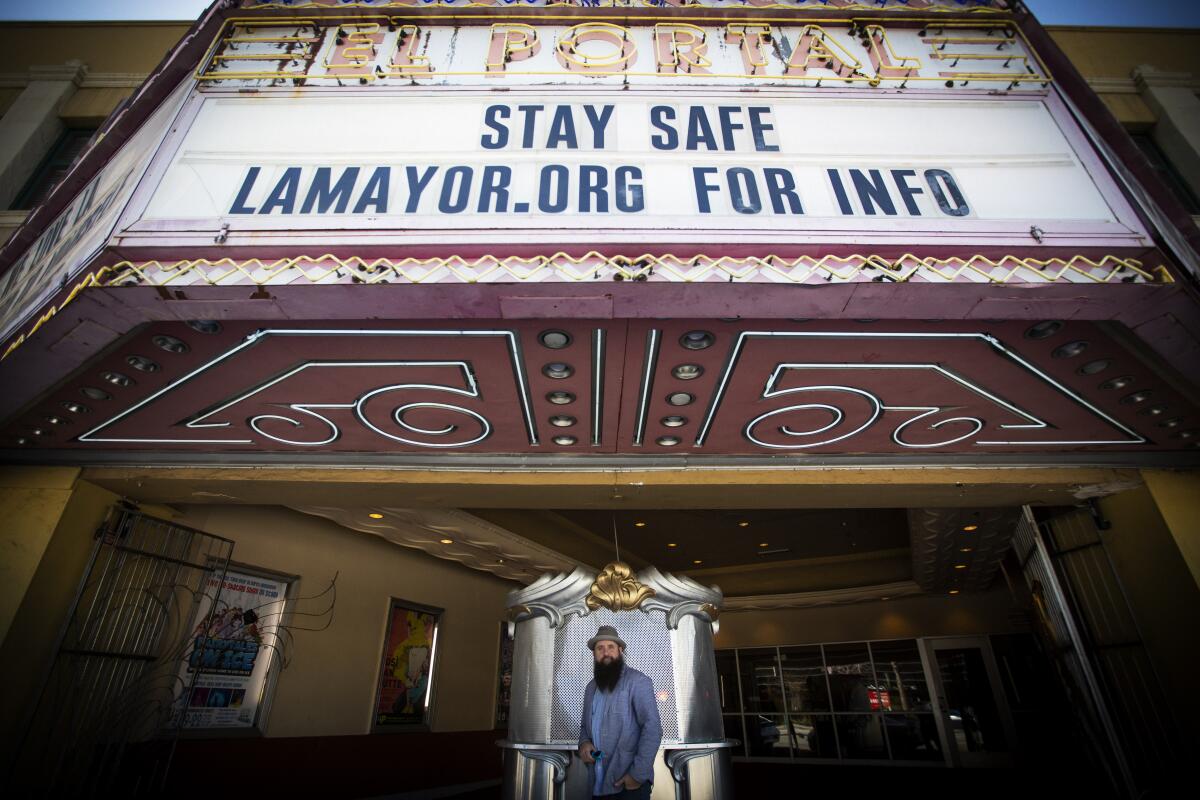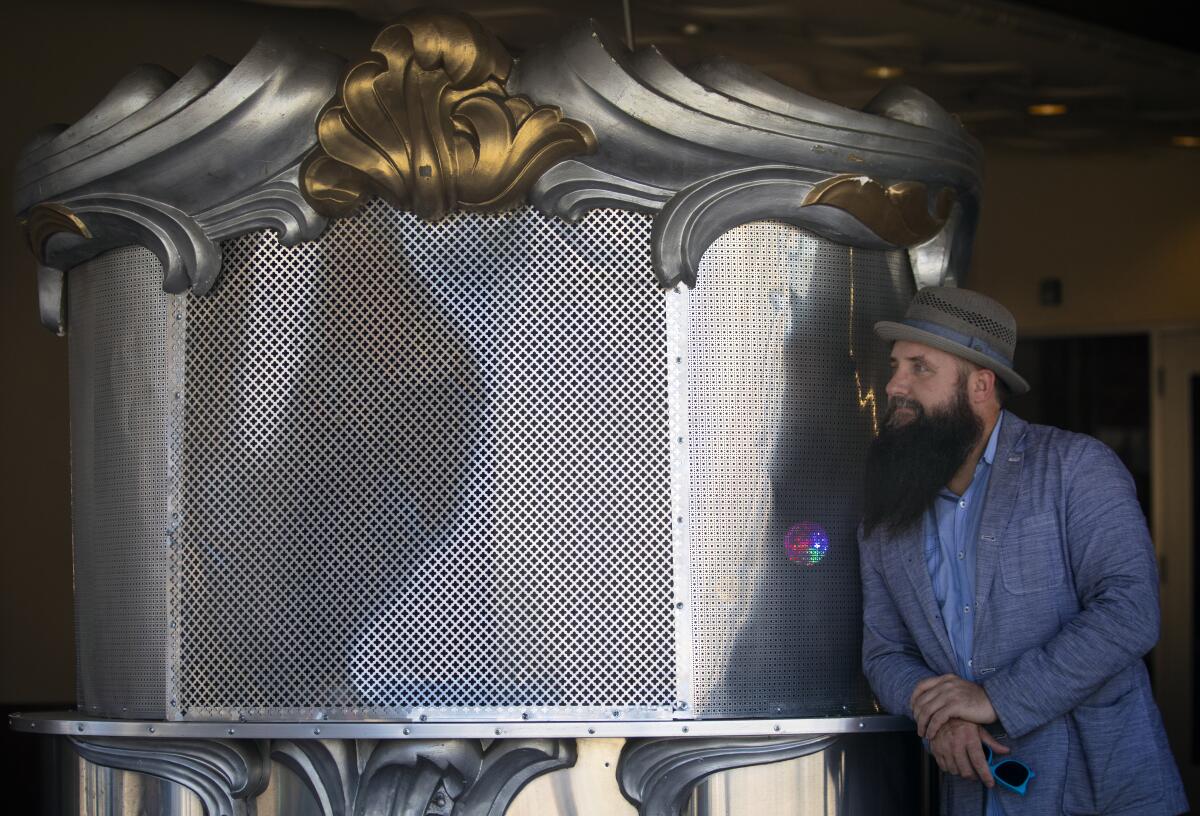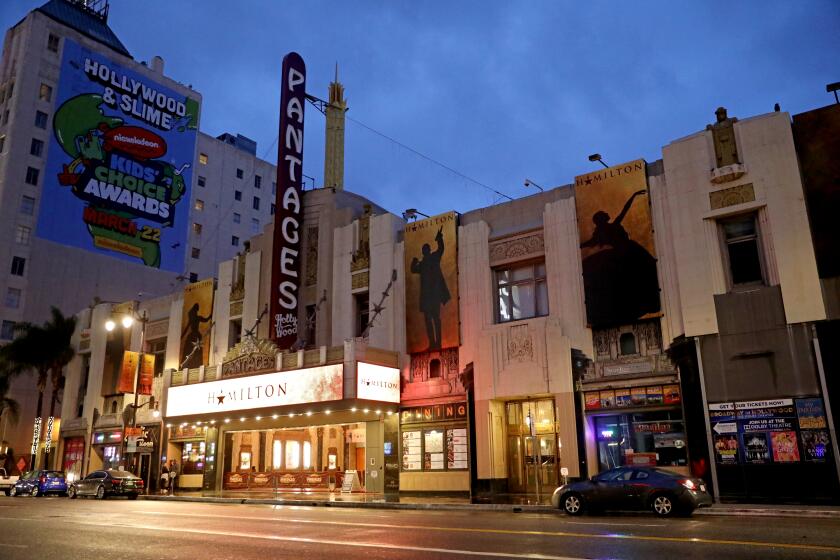AB 5 forced arts groups to evolve. For some, COVID-19 made the change ‘catastrophic’

- Share via
Even before the coronavirus entered the picture, the Los Angeles-based Pacific Opera Project faced a daunting challenge in January: turn an operation with just three official employees into a company with about 200 singers and other part-time employees on payroll.
The move was triggered by a new state law, AB 5, that aimed to expand benefits such as workers’ compensation and a minimum wage to people formerly classified as freelancers and independent contractors.
“We had the money and we said, ‘This is the law, we’re going to follow it,’” said the company’s founding Artistic Director and Chief Executive Josh Shaw. The opera company’s projected 2020 budget had been about $500,000, but with AB 5, Shaw saw his expenses balloon by $44,000.
Then COVID-19 came to California, and Gov. Gavin Newsom recommended canceling public gatherings of 250 or more people — just one day into Pacific Opera Project’s rehearsal for Mozart’s “Cosi fan Tutte.” The company, which had expected to make $57,000 from ticket sales, had to cancel the production instead, losing $22,000 on the venue rental, sets and costumes, artist fees and promotional materials.
And in the end, Shaw still wasn’t sure if AB 5 ultimately did much to protect his cast and crew. Shaw paid “Cosi” artists but said he was unsure if they were eligible for benefits, including sick leave, because the show was canceled.
“That’s the biggest issue we’ve had with this whole law,” he said. “There’s so little information out there and we really did our homework. It’s just uncharted territory.”

For California’s arts community, the collision of the new law with the coronavirus outbreak has brought new questions and quickly amplified voices to both sides of a growing debate: Does the pandemic prove the need for AB 5?
Defenders of AB 5 and some artists struggling to make ends meet in an economy reeling from job losses said the need for additional protections is clearer than ever.
Intended to reduce misclassification of employees, AB 5 establishes a test to determine whether workers should receive minimum wage, paid sick days and other benefits.
AB5, the state’s new gig economy law, is intended to protect workers. But small theater, opera and dance companies worry it could ruin them.
The public health crisis shows the “vulnerability in general of the arts sector,” said the author of AB 5, Assemblywoman Lorena Gonzalez (D-San Diego). “It’s something to remind us that we need to provide some sort of safety net for people who make a living in the arts and ensure that when things are canceled and put off that they can still pay the bills.”
Reclassifying artists as employees ensures they can get paid sick days, access unemployment or claim workers’ compensation if they get ill or injured on a job, Gonzalez said. (Independent contractors and self-employed workers do have access to unemployment benefits through the $2-trillion coronavirus stimulus bill signed into law in late March.)
Cisco Ruelas, an L.A.-based choreographer who has worked with Lil Wayne and Jennifer Lopez, estimates that 80% of his income comes from teaching classes. Many professional dancers and choreographers are self-employed and teach dance, yoga or Pilates to make ends meet — streams of income that have dried up.
Although Ruelas was invited to join the union SAG-AFTRA, which provides benefits to performers, he said gaining and maintaining eligibility is a challenging and extensive process, so he decided not to join. But for other people like Ruelas, AB 5 holds the promise of automatically providing more security.
Critics, however, argue that the independent contractor model is integral to the arts community. Many artists prefer the freedom of being independent contractors, and many small and midsize arts groups — theater companies, dance troupes, opera ensembles — have historically relied on cast and crew willing to work for low flat fees in exchange for professional exposure, experience or simply the artistic satisfaction of being part of a project.
Pacific Opera Project’s Shaw said he tried to do the right thing and follow the law. But having spent more money on compliance and then losing ticket revenue to the coronavirus cancellation, he needed to lean further on donors to keep his company alive. “I understand the intent was to make sure everyone is getting paid fairly,” Shaw said, but he will have to cut programs or hire fewer artists moving forward to make ends meet.
In February, Gonzalez wrote in a series of tweets that she will roll out initiatives to ease the implementation of the law and clarify its provisions. She and other legislators asked for $20 million to fund a grant program for small nonprofit community arts programs transitioning employees under AB 5 in the coming months.
And on Friday, Gonzalez announced pending amendments to the law for people in the music industry.
With the pandemic taking center stage, it’s unclear when the updates will go into effect. The legislature is on emergency recess until at least May 4.
Gonzalez told The Times previously that clarifying the law’s “fine artist” exemption is a job that falls to the state’s Employment Development Department. But the department is facing an unprecedented number of unemployment claims amid the coronavirus crisis. More than 2.5 million Californians filed applications in the last month.
The intersection of AB 5 and the coronavirus could bring attention to “the good intention of the legislation, trying to support workers with their protections and benefits,” said Julie Baker, executive director of the advocacy group Californians for the Arts. At the same time, she added, “we also know that there’s still a lot of people who benefit from remaining independent, and it does work for a lot of people in our sector in terms of their lifestyle.”
In the meantime, companies are doing what they can to survive.
Donate the cost of a canceled ticket, take an online dance class, buy a piece of fine art: Here are 22 ways to help artists weather the coronavirus storm.
Although East West Players’ producing artistic director Snehal Desai said there was “a lot of confusion” around AB 5, the theater worked to be in full compliance, adding about 50 actors, crew, front of house staff and managers to the payroll for its March show, “Assassins.”
The theater, which had just six employees before AB 5, took out a line of credit to help cover the additional costs — $60,000 on top of the show’s original $250,000 budget. To reduce expenses in the future, the theater had planned to scale back its 2020-2021 season and employ fewer actors.
When the pandemic hit, East West Players had to pause previews and cancel its fundraiser gala and youth program tour. “So now we’re just hemorrhaging money,” Desai said.
“It was really bad before. Now it’s catastrophic and we just don’t know where we’re going to land. Everything is just messy now.”
He added that East West Players wasn’t opposed to the intent behind AB 5. “It was just the way it was rolled out — the suddenness of it, the lack of nuance for industry, the lack of support for nonprofits and small businesses to have to comply.”
Under direction from its board of directors, Sierra Madre Playhouse canceled its March production of “Charlotte’s Web” in late January because the cost of converting independent contractors to employees would have added $38,000 to the production’s $52,000 budget.
Unlike many other arts organizations, though, Sierra Madre Playhouse owns its theater.
“I think we will be OK,” Artistic Director Christian Lebano said. But as the predicted length of closures grows longer and longer, he added, “I just don’t know how this arts community is going to weather this.
“When things start coming back, it’s going to be hard to ask donors to give us money when there are so many people who will be unemployed and other small businesses that have closed.”
Shaw had planned to apply to the $350-billion federal relief program for small businesses but learned the program had run out of funds by the time he finished preparing the application. He’s been meeting with leaders from other opera companies to discuss other funding ideas.
Although Shaw ultimately believes Pacific Opera Project will weather the storm, he worries for other artists and arts organizations hanging on by a thread.
He suggested one quick fix to help the arts community survive: “We’re in a bad place right now. Everyone is,” Shaw said. “Let’s just table AB 5 — at least for now — so you don’t have to deal with that on top of everything.”
More to Read
The biggest entertainment stories
Get our big stories about Hollywood, film, television, music, arts, culture and more right in your inbox as soon as they publish.
You may occasionally receive promotional content from the Los Angeles Times.











